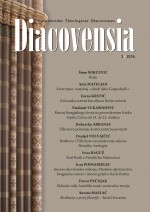APSOLUTNI »JA JESAM« U IZLASKU 3,14 I U HOŠEE 1,9
THE ABSOLUTE »I AM« IN EXODUS 3:14 AND HOSEA 1:9
Author(s): Ivan Andelfinger, Ivica ČatićSubject(s): Christian Theology and Religion, Theoretical Linguistics, Biblical studies, Translation Studies
Published by: Katolički bogoslovni fakultet u Đakovu
Keywords: the Bible; the Old Testament; God’s name; the formula »I AM«; historical salvational function; the formula »I AM NOT«;
Summary/Abstract: In the article the authors confront the meanings of two Hebrew verb forms and their translations in biblical Greek and modern translations. It is the verb form ´ehyè in Ex 3:14, and its negation lö’-’ehyè in Hosea 1:9. These verb forms can be translated in the Croatian language as Ja jesam (I am) and Ja nisam (I am not) in the absolute sense. The study aims to shed light on the historical, philological and theological relations of the positive (Ex 3:14) and negative formulation (Hosea 1:9). In the Old Testament the Lord’s absolute »I AM« has its foundation in the experience of the chosen people, it appears in key moments in Israel’s history and is directed to the holy name of God. In Ex 3:14, God appeared to Moses as ´ehyè ´ášer ´ehyè (I AM WHO I AM), which the Septuagint translated into Greek as egō eimi ho ōn (I AM HE WHO IS). The Hebrew construction is cryptic and difficult to translate. Since it is almost impossible to determine the correct translation only from the morphosyntactic analysis, biblical scholars resort to the context in which the cryptic words are spoken. Although the traditional translation is »I AM WHO I AM,« in recent years biblical scholars are increasingly opting for the future aspect of translation. In this paper, special attention will be directed toward this translation in the future tense and the question of its legitimacy.
Journal: Diacovensia: teološki prilozi
- Issue Year: 22/2014
- Issue No: 3
- Page Range: 329-361
- Page Count: 33
- Language: Croatian

